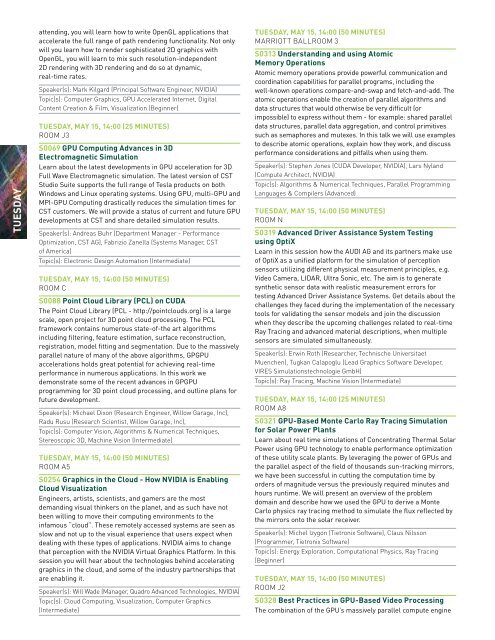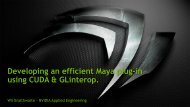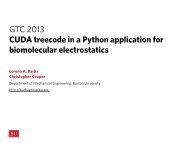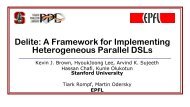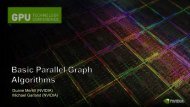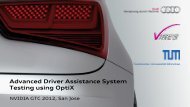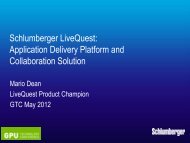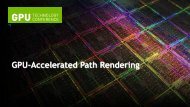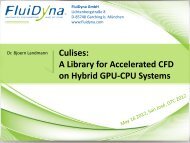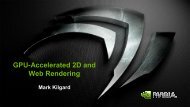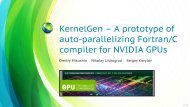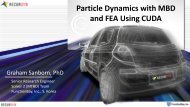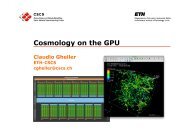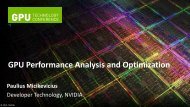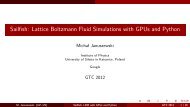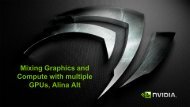GTC 2012 Program Guide - GPU Technology Conference
GTC 2012 Program Guide - GPU Technology Conference
GTC 2012 Program Guide - GPU Technology Conference
You also want an ePaper? Increase the reach of your titles
YUMPU automatically turns print PDFs into web optimized ePapers that Google loves.
TUESDAY<br />
attending, you will learn how to write OpenGL applications that<br />
accelerate the full range of path rendering functionality. Not only<br />
will you learn how to render sophisticated 2D graphics with<br />
OpenGL, you will learn to mix such resolution-independent<br />
2D rendering with 3D rendering and do so at dynamic,<br />
real-time rates.<br />
Speaker(s): Mark Kilgard (Principal Software Engineer, NVIDIA)<br />
Topic(s): Computer Graphics, <strong>GPU</strong> Accelerated Internet, Digital<br />
Content Creation & Film, Visualization (Beginner)<br />
TUESDAY, MAY 15, 14:00 (25 MINUTES)<br />
ROOM J3<br />
S0069 <strong>GPU</strong> Computing Advances in 3D<br />
Electromagnetic Simulation<br />
Learn about the latest developments in <strong>GPU</strong> acceleration for 3D<br />
Full Wave Electromagnetic simulation. The latest version of CST<br />
Studio Suite supports the full range of Tesla products on both<br />
Windows and Linux operating systems. Using <strong>GPU</strong>, multi-<strong>GPU</strong> and<br />
MPI-<strong>GPU</strong> Computing drastically reduces the simulation times for<br />
CST customers. We will provide a status of current and future <strong>GPU</strong><br />
developments at CST and share detailed simulation results.<br />
Speaker(s): Andreas Buhr (Department Manager - Performance<br />
Optimization, CST AG), Fabrizio Zanella (Systems Manager, CST<br />
of America)<br />
Topic(s): Electronic Design Automation (Intermediate)<br />
TUESDAY, MAY 15, 14:00 (50 MINUTES)<br />
ROOM C<br />
S0088 Point Cloud Library (PCL) on CUDA<br />
The Point Cloud Library (PCL - http://pointclouds.org) is a large<br />
scale, open project for 3D point cloud processing. The PCL<br />
framework contains numerous state-of-the art algorithms<br />
including filtering, feature estimation, surface reconstruction,<br />
registration, model fitting and segmentation. Due to the massively<br />
parallel nature of many of the above algorithms, GP<strong>GPU</strong><br />
accelerations holds great potential for achieving real-time<br />
performance in numerous applications. In this work we<br />
demonstrate some of the recent advances in GP<strong>GPU</strong><br />
programming for 3D point cloud processing, and outline plans for<br />
future development.<br />
Speaker(s): Michael Dixon (Research Engineer, Willow Garage, Inc),<br />
Radu Rusu (Research Scientist, Willow Garage, Inc),<br />
Topic(s): Computer Vision, Algorithms & Numerical Techniques,<br />
Stereoscopic 3D, Machine Vision (Intermediate)<br />
TUESDAY, MAY 15, 14:00 (50 MINUTES)<br />
ROOM A5<br />
S0254 Graphics in the Cloud - How NVIDIA is Enabling<br />
Cloud Visualization<br />
Engineers, artists, scientists, and gamers are the most<br />
demanding visual thinkers on the planet, and as such have not<br />
been willing to move their computing environments to the<br />
infamous “cloud”. These remotely accessed systems are seen as<br />
slow and not up to the visual experience that users expect when<br />
dealing with these types of applications. NVIDIA aims to change<br />
that perception with the NVIDIA Virtual Graphics Platform. In this<br />
session you will hear about the technologies behind accelerating<br />
graphics in the cloud, and some of the industry partnerships that<br />
are enabling it.<br />
Speaker(s): Will Wade (Manager, Quadro Advanced Technologies, NVIDIA)<br />
Topic(s): Cloud Computing, Visualization, Computer Graphics<br />
(Intermediate)<br />
TUESDAY, MAY 15, 14:00 (50 MINUTES)<br />
MARRIOTT BALLROOM 3<br />
S0313 Understanding and using Atomic<br />
Memory Operations<br />
Atomic memory operations provide powerful communication and<br />
coordination capabilities for parallel programs, including the<br />
well-known operations compare-and-swap and fetch-and-add. The<br />
atomic operations enable the creation of parallel algorithms and<br />
data structures that would otherwise be very difficult (or<br />
impossible) to express without them - for example: shared parallel<br />
data structures, parallel data aggregation, and control primitives<br />
such as semaphores and mutexes. In this talk we will use examples<br />
to describe atomic operations, explain how they work, and discuss<br />
performance considerations and pitfalls when using them.<br />
Speaker(s): Stephen Jones (CUDA Developer, NVIDIA), Lars Nyland<br />
(Compute Architect, NVIDIA)<br />
Topic(s): Algorithms & Numerical Techniques, Parallel <strong>Program</strong>ming<br />
Languages & Compilers (Advanced)<br />
TUESDAY, MAY 15, 14:00 (50 MINUTES)<br />
ROOM N<br />
S0319 Advanced Driver Assistance System Testing<br />
using OptiX<br />
Learn in this session how the AUDI AG and its partners make use<br />
of OptiX as a unified platform for the simulation of perception<br />
sensors utilizing different physical measurement principles, e.g.<br />
Video Camera, LIDAR, Ultra Sonic, etc. The aim is to generate<br />
synthetic sensor data with realistic measurement errors for<br />
testing Advanced Driver Assistance Systems. Get details about the<br />
challenges they faced during the implementation of the necessary<br />
tools for validating the sensor models and join the discussion<br />
when they describe the upcoming challenges related to real-time<br />
Ray Tracing and advanced material descriptions, when multiple<br />
sensors are simulated simultaneously.<br />
Speaker(s): Erwin Roth (Researcher, Technische Universitaet<br />
Muenchen), Tugkan Calapoglu (Lead Graphics Software Developer,<br />
VIRES Simulationstechnologie GmbH)<br />
Topic(s): Ray Tracing, Machine Vision (Intermediate)<br />
TUESDAY, MAY 15, 14:00 (25 MINUTES)<br />
ROOM A8<br />
S0321 <strong>GPU</strong>-Based Monte Carlo Ray Tracing Simulation<br />
for Solar Power Plants<br />
Learn about real time simulations of Concentrating Thermal Solar<br />
Power using <strong>GPU</strong> technology to enable performance optimization<br />
of these utility scale plants. By leveraging the power of <strong>GPU</strong>s and<br />
the parallel aspect of the field of thousands sun-tracking mirrors,<br />
we have been successful in cutting the computation time by<br />
orders of magnitude versus the previously required minutes and<br />
hours runtime. We will present an overview of the problem<br />
domain and describe how we used the <strong>GPU</strong> to derive a Monte<br />
Carlo physics ray tracing method to simulate the flux reflected by<br />
the mirrors onto the solar receiver.<br />
Speaker(s): Michel Izygon (Tietronix Software), Claus Nilsson<br />
(<strong>Program</strong>mer, Tietronix Software)<br />
Topic(s): Energy Exploration, Computational Physics, Ray Tracing<br />
(Beginner)<br />
TUESDAY, MAY 15, 14:00 (50 MINUTES)<br />
ROOM J2<br />
S0328 Best Practices in <strong>GPU</strong>-Based Video Processing<br />
The combination of the <strong>GPU</strong>’s massively parallel compute engine


